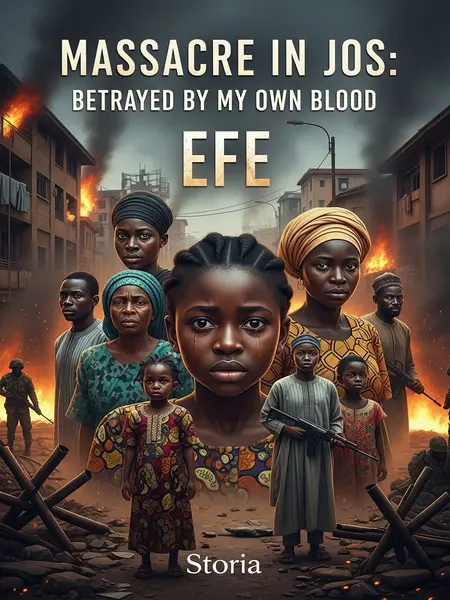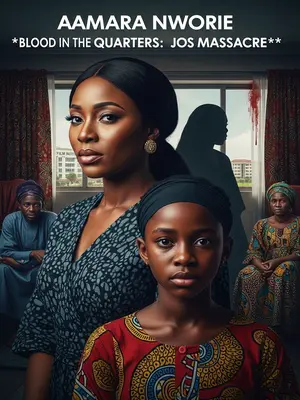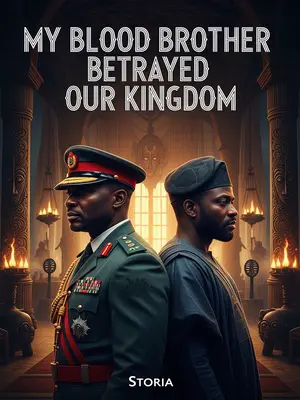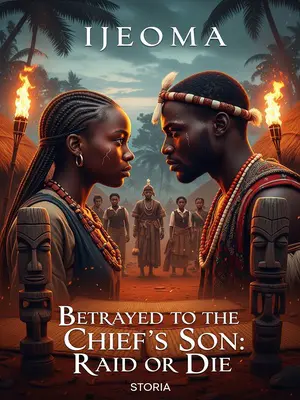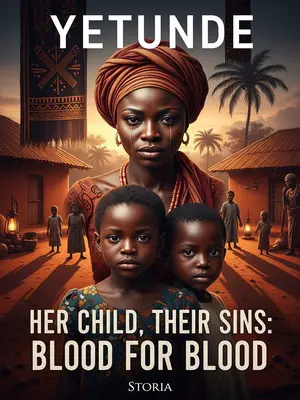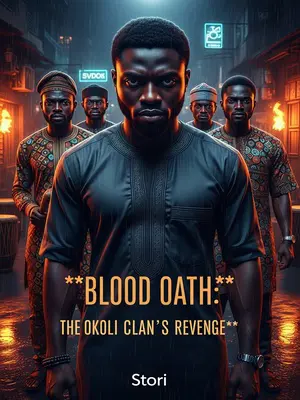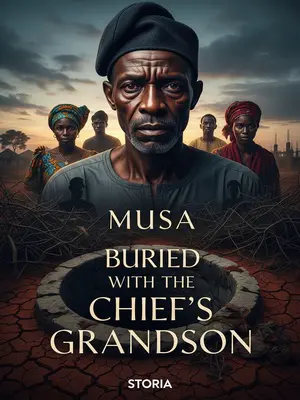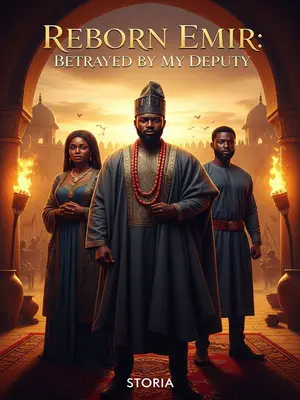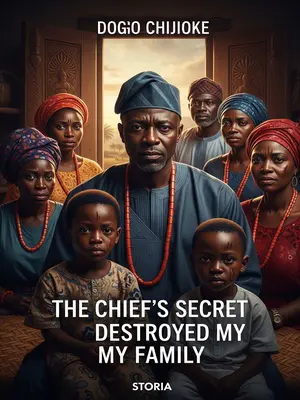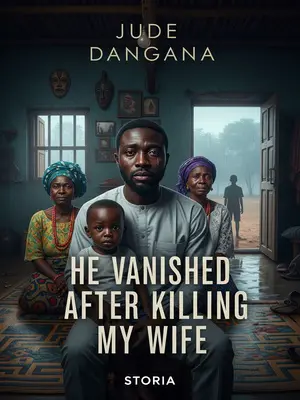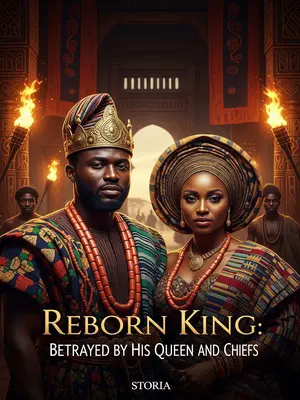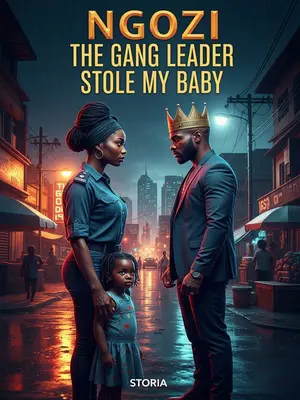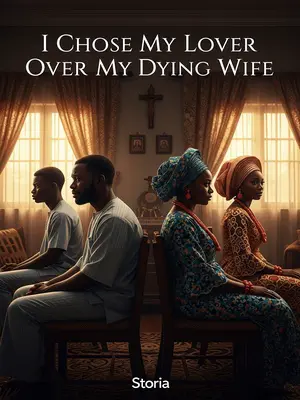Chapter 1: When the Sky Fell Over Jos
What does a city massacre look like when it happens before your eyes? Sometimes, it’s as if the whole sky groans and sags, too heavy to hold back the evil that’s seeped into the soil. Your own breath gets stuck in your chest, and your heart beats like the ogene at a burial. The whole city—just gone.
Hide in your house? Soldiers will move from door to door, list in hand, wiping out families one by one.
Even if you lock the zinc gate and wedge a mortar behind it, the boots will find you. From GRA down to Tudun Wada, nobody is safe. The banging and shouts—"Open up! If you no open, na you go suffer pass!"—echo through the streets, heavier than harmattan dust.
Try to run from the city? You’ll meet guns mounted on rooftops—snipers calling names, shooting people down like goats waiting for slaughter.
On the roads, old men carrying grandchildren, women with market baskets, boys darting from gutter to gutter—they all fell. From the top of NEPA buildings or the telecom mast by the roundabout, sharp voices called, "Yahaya Musa! Hauwa!" and the gun barked. The ground drank blood like palm wine.
Wait for help? Even if peacekeeping troops arrive, they’re slaughtered the same.
It’s not like those films where blue-helmeted soldiers show up and everybody shouts for joy. Here, peacekeepers got caught in the crossfire—shot like dogs, their uniforms turning brown with dust and blood. Even the Red Cross lorry was set ablaze, volunteers left for the vultures.
Stock up and try to endure? The siege lasts five years, but the garri and Indomie you stored only last for two—wetin you go chop for the remaining three years?
At first, neighbours shared, measuring out rice by the handful, hiding yams under beds. After two years, only the last grains of garri stuck to buckets. Stomachs groaned with hunger that made hands shake. At night, whispers of cannibalism crept through the darkness, fear mixing with shame.
The answer is simple: your relatives and friends.
People did unspeakable things to survive. The ones who died first were sometimes the luckiest. The city stank with secrets and sorrow, every compound hiding a ghost in the backyard. Hunger turns a man to beast, and the beast cannot hear his brother’s cry.
This is not some made-up story. It happened not so far from here, at the end of the last century—in Jos, a modern city that once hosted the National Sports Festival.
Ask any old taxi driver at Terminus or the market women at Farin Gada, and their eyes will cloud. They remember. Jos—where boys once kicked footballs by the stadium and laughter was as common as the scent of suya—became a land of weeping.
The massacre lasted five years, while those so-called civilized societies of Europe and America turned their eyes away from the bloodshed.
CNN might have shown one or two clips, and the embassies sent warnings, but for five years, the world pretended not to hear. While people in London and New York sipped tea, in Jos, children drank water mixed with blood and ash.
April 5, 1992: the day before the Jos massacre began.
That evening, the city simmered with tension. You could feel it in the way okada riders refused passengers after dusk, in the murmurs from mosques and churches. Clouds pressed low, as if even the Plateau hills were holding their breath.
Jos was fighting for independence, struggling to break free from the military government’s iron grip.
You saw anger on the faces of the youth—boys in faded jeans, girls tying wrappers over jeans. They spoke in hushed tones at beer parlours and student hostels, plotting how to break free. "We don suffer too much! This oppression must end!" they’d say, raising fists, heads hot with hope.
But the government’s response was sharp and wicked:
It wasn’t the first time soldiers had stormed a Nigerian city. But this time, they wasted no time: radio jingles called the people traitors, and the army rolled in like harmattan wind—cold and unstoppable. "Anyone who tries to resist will meet their ancestors early," they declared.
They tagged Jos people as rebels, then sent the army to surround the city so tightly that not even a lizard could escape.
Helicopters circled above, casting shadows like hawks. Checkpoints sprang up everywhere: Zaria Road, Bukuru, Miango—all sealed. Even the beggars by the main mosque whispered, "Today na today." Not even a stray goat could pass without being stopped.
The army commander gave an order: if Jos was still fighting for independence tomorrow, the whole city would be wiped out.
The message went out on crackling radio, and within the hour, every compound was buzzing. "If dem no surrender, na everybody go chop pepper!" whispered a trader at Terminus. Fear clung to the air, thick as smoke from roasted maize.
"Not one living soul left—let’s see how you’ll do your independence referendum then."
Soldiers repeated the threat with swagger, some laughing as they loaded their guns. "We go wipe una commot for this map!" Old folks shook their heads, muttering, "Ah, Nigeria don spoil."
At this time, Efe, still a university student, joined one hundred thousand Jos citizens to protest on the streets.
Efe wore her old University of Jos shirt, sweat staining the collar. Her friends, some Hausa, some Berom, squeezed her hand tight. They carried hand-painted banners—"NO TO ETHNIC HATE! WE ARE ALL NIGERIAN!"—and sang as they marched. The streets pulsed with hope and fear, every face set with determination.
They didn’t even realize their true situation—they were like goats waiting for slaughter.
People chanted and danced, but if you looked closely, you’d see the crowd’s energy was built on blind faith, on hope the world would hear. "Dem dey play!" old men muttered by the roadside, shaking their heads. "These children no know say dem dey enter lion den."
They tried, with small and fragile strength, to defend a shaky peace.
With trembling hands, they stood, linking arms. Someone began a song—"We shall overcome, someday!"—and the chorus rippled, trembling with longing. More mothers and children than usual; some clutched Bibles, others held worn Qurans.
Among these one hundred thousand, there were Hausa, Christians, and Berom. At that moment, nobody cared about tribe or religion—they all sang the national anthem together with one voice.
The anthem rang out—"Arise, O Compatriots!"—and for once, it sounded as if the words really meant something. Old divides—Muslim, Christian, Berom—fell away like old wrappers. Sweat, hope, and fear mixed on their faces; for those minutes, they were one people.
Outside the city, the army had already blocked all roads and declared martial law in Jos.
On the edge of town, trucks full of stern-faced soldiers idled. Sandbags lined the roads, and the air stank of diesel and nervousness. The martial law announcement crackled over portable radios: "All citizens must remain indoors. No movement from 6pm. Violators will be dealt with ruthlessly." The sense of doom thickened.
Everybody inside had heard the news. Blockade and martial law meant soldiers would enter the city, check IDs house by house, drag out so-called rebels, and kill them on the streets.
Neighbours called each other, "You don hear am? Dem say make we no waka after six!" Mothers peeped through curtains, eyes wide, as soldiers marched past. Fathers hid ID cards, whispered, "If dem ask, say you dey my family." Panic grew, but some still hoped, "Maybe it will blow over." Others counted their last savings, worrying about escape.
To prepare for this killing, the army had already done practice massacres, calling it "community cleansing."
Some said they saw soldiers, weeks before, rounding up entire compounds in Angwan Rogo and Tudun Wada, dragging out men and boys. They called it "cleaning up bad eggs," but the people knew—nothing good ever followed such talk. The stench of burnt tyres lingered, a warning.
Does "community cleansing" sound familiar?
In whispered conversations, elders compared it to Rwanda. "Wetin happen for there fit happen here," they said, voices trembling. The chill crawled down spines. Ghosts of Rwanda seemed to dance in the Jos night, stories mixing with the wind.
That’s the same excuse used in Rwanda. Even though those people are gone, their followers in Nigeria took it even further.
Old men at the suya spot shook their heads, spat, and cursed, "Na so dem start for Rwanda, just like play! Now see, our own people dey do pass them." The idea that Jos—a city of cool weather and kola nuts—could be another Rwanda, made the blood run cold.
The army outside claimed to believe in One Nigeria, but in truth: they were ethnic supremacists, wanting only their own people in charge.
The soldiers painted their faces with the flag, but their tongues dripped hatred. "One Nigeria" was only for the microphone. In their hearts, they wanted a city where only their own tongue was spoken, their own name ruled.
What they hated most was a city like Jos, where many tribes and religions lived together in peace.
Somewhere in their hearts, the sight of children with Yoruba names playing with Hausa and Berom friends made them uneasy. They called Jos a "city of bastards," unable to accept that peace could exist outside their rules. That peace was the real threat to their power.
Even more shocking was their leader: Colonel Danladi, a former doctor.
People used to say, "Ah, Danladi na doctor o! E get sense!" But that sense twisted into something dark. Even the market women who sold him oranges once muttered, "This man no well again."
But this man was a madman, convinced that only by killing all non-natives could his people become great again. For this, he kept inventing new tricks and new excuses for mass killing.
He gave speeches about "purity" and "restoration," eyes bulging, mouth frothing. Some called him the Plateau Pharaoh. He invented stories—fake bomb threats, rumours of poisoned wells—anything to justify his next slaughter. His aides watched, afraid to speak.
Anybody who went to school for nine years wouldn’t believe such mad talk.
University students laughed at first, "Who dey believe this kain thing?" But the laughter faded as the killings began. Teachers shook their heads, "No be book this man read? Wetin him come dey do?"
After all, they were all one people.
Everybody still went to the same market, greeted the same Mai Shayi, and bought groundnut from the same roadside women. Efe herself had friends in every corner, and nobody thought to ask about your father’s village unless there was trouble.
Besides, in Jos, most people had stopped caring about religion—if you wanted to know someone’s tribe, you had to check their ID card.
In reality, churches and mosques stood on the same street, and children played football on their compounds. The only time tribe or religion mattered was when people filled out government forms, or when politicians started trouble.
So neither blood nor religion could divide the people of Jos.
When wahala came, people remembered shared memories—not differences. Even in heated market arguments, the line was drawn at "We be Jos pikin." It was outsiders, those with power and guns, who tried to split them.
People from all backgrounds joined hands to protest against ethnic hatred—nothing strange about that.
From barracks to university, mosque to cathedral, hands of every colour joined. Old rivals, market women who used to quarrel over tomatoes, now passed water to each other and chanted for peace. The spirit of Jos was stubborn: "We go survive, we go stand together!"
Facing a united Jos, the supremacists decided to use cunning first:
They slipped into the crowd in mufti, blending in. By the time the protest neared the council secretariat, the mischief had already begun. Some spread rumours, others tossed stones to start confusion. It was an old tactic—use chaos to justify violence.
Before the protest reached city hall, they disguised themselves as rioters and took over the place.
Masked men scaled fences, waving cutlasses and torches. The real protesters hesitated, shocked as these fake rioters stormed city hall, smashing glass and setting curtains ablaze. They moved with evil precision—you knew they’d done this before.
Local Hausa officials who refused to join them were taken hostage; Christian officials were thrown out the window.
City hall, once a place of speeches and school excursions, became a slaughterhouse. The sound of bodies hitting the ground echoed. Onlookers screamed, ducked, and ran. The rioters roared, "No mercy for traitors!" Chaos spread like wild fire.
At 5 p.m. on April 5, a crowd led by university students marched proudly towards city hall—the peak of the protest. They had no idea what was waiting. They wanted to petition the chairman, to show the world that peace was possible if they embraced each other.
Efe gripped her petition, leading chants with her friends. Students carried flowers and letters—hope in their hands. They planned to present them at city hall’s steps, faces full of dreams.
But the chairman’s body was hanging from a street lamp.
A terrible hush fell. The chairman—a man who once danced at their independence day—now dangled, shoes missing, shirt torn, face swollen. Shock ripped through the crowd, a silent scream tearing the fabric of hope.
The protesters screamed and scattered; their hopes shattered like soap bubbles.
Women fainted, students tripped over each other. Bags and sandals littered the ground. Some tried to help the wounded, others ran for their lives. The hot afternoon air filled with shouts, curses, and gunfire crackling from nowhere.
The rioters weren’t ready to let these unarmed people go—they wanted to teach these "heretics" a lesson.
It was as if they waited for this moment. Faces twisted with excitement, guns waving, they formed a line at the crowd’s edge. Their laughter sounded like broken glass. The word "heretic" meant nothing but "target." No escape.
The machine guns, already waiting, opened fire on the panicked crowd.
First shots sounded like firecrackers, then real horror began. The air shook with bullets, people dropping like mangoes from a shaken tree. The ground was slick with blood, banners trampled and torn.
The students in front fell like grass under a cutlass.
A young man beside Efe, holding the Nigerian flag, was first to drop. Girls screamed, falling to their knees, others scrambled over fallen friends. It was a harvest of death, as swift and heartless as harmattan wind.
Efe, because she was short, managed to escape by luck.
She was shoved aside by taller boys, stumbled, and rolled into a gutter. The cold filth saved her life. She crawled out the other side, shaking, shirt soaked through.
Her father, a Jos police chief, led his men to fight back, shooting while trying to save the wounded.
Chief Babangida—her father—barked orders, pistol blazing, dragging a wounded youth behind a kiosk. "No retreat! No surrender!" he shouted. His men, few but determined, held off attackers as long as they could, but bullets are not loyal. The police radio crackled with desperate voices, "Backup! Please, we need backup!"
Now, everyone understood: war had started, and there was no stopping it.
Panic swept the streets. Families dragged children under cars, prayers mixed with curses. You could see terror in every eye—this was not protest, not negotiation. It was war, with no rules and no mercy.
That night, Efe with a bruised face and her father covered in dust returned home. Her worried mother broke down in tears as the TV reported: several students shot dead, the number of casualties still rising.
Mama Efe rushed to hug her daughter, wrapper half-tied, face streaked with tears. The TV blared, "Unrest in Jos! Many feared dead!" They huddled together, listening to distant gunfire, knowing nothing would ever be the same. Sweat and fear clung to their clothes.
If you were a normal person, you would have started running by now.
Most would pack Ghana-Must-Go bags, scoop up children, and disappear into the bush or onto the next lorry. "My pikin, make we waka now now!" But not this family. They stayed, clinging to hope and the walls called home.
But this family still held onto hope:
Efe’s father whispered, "We be Hausa, dem no go touch us." Her mother squeezed her hand. Belonging, tribe—a thin shield. They cooked a small pot of soup, ate in silence, and prayed the city would return to normal.
They were all Hausa. Hausas don’t kill Hausas, and unless you have no choice, who wants to leave their own house?
That’s how people reasoned, clinging to old bonds. "Na our people dey do this thing. E no fit reach us," they said. The comfort of familiar language, the muezzin’s call at dawn, made them believe, if only for a while.
Years later, whenever Efe remembered that night, she wished she had begged her family to leave Jos together. You can always build another house, but once you lose your life…
Regret is sharp. In quiet moments, Efe’s heart would ache. She pictured roads not taken, suitcases left unpacked. The price of hope, she learned, is often paid in tears and graves.
In fact, most people in Jos clung to hope, thinking the killings would pass and war would end in a few days.
Nobody wanted to believe neighbours would turn on them. Wasn’t this the city where people borrowed salt and maggi cubes? Where Sallah and Christmas meant open doors and free food? Denial was easier than panic.
After all, this was the 20th century, in a Nigerian city—who could imagine how bad war could be?
"We be civilised people!" they told themselves. They had TVs, cars, modern houses. War was something for the history books, not for Jos. But the sound of gunshots and burning houses told a different story.
April 6, 1992. The police station was soaked in blood.
Dawn brought no comfort. The police station—once a place of order—reeked of fear and spilled palm oil. The flag hung limp, blood splattered on the signboard. The air was heavy with doom; birds did not sing.
In the afternoon, Efe’s school told her to pack her things. No online class back then, so the school would probably close for some time.
She gathered books and uniform, stuffing them into a nylon bag. Teachers’ faces were tight. "Go straight, no waka for road!" the headmistress warned. The compound was full of anxious parents, faces pale.
Thinking of this, Efe felt a bit lighter in her heart.
No more exams for now; no more bullying seniors. She allowed herself a small smile, then felt guilty for it. Danger felt distant, like a bad dream.
On her way home, Efe would pass the police station—maybe she could see her busy father.
She quickened her steps, eager to wave to her father through the open gate. Maybe he’d buy her puff-puff from the roadside seller. That hope warmed her as she neared the station.
But that was the last time they would meet:
A strange quiet filled the air. Smoke curled above the police station. Efe paused, heart pounding. The gate hung open, glass scattered on the road. Something felt wrong—she could sense it in her bones.
A group of masked rioters were attacking the police station, some with white cloths tied around their heads—a look people usually associated with Muslims.
Men chanted, waving machetes, faces hidden behind scarves. White cloths wrapped around their heads made passersby uneasy. Children pointed, whispering, "Dem be Muslim?" but even elders frowned, unsure.
But this looked odd in Jos—the local Muslims didn’t even dress like that.
In Jos, religious dress was relaxed; people mixed tradition and city style. To see these men so costumed was jarring—like actors in the wrong play. Clearly outsiders, or pretending.
After years of city life, Muslims in Jos had stopped following strict Islamic rules. Even those who still believed, followed a watered-down, secular version.
Mosques stood next to bars, and Eid prayers ended with neighbours sharing zobo and kilishi. Nobody insisted on full hijab or robes—faith was private, lived quietly.
The slogans these people shouted were just as ridiculous:
Their chants—"Burn all infidels!"—were loud but hollow, as if repeating someone else’s madness. Even the market women selling akara across the road stared, muttering, "This one no be our people."
Seeing this, Efe’s father went out, hoping to reason with these mad people.
Chief Babangida, in full uniform, stepped out, hands raised. He shouted, "We be one people! Stop this madness!" His voice cracked with emotion, but the crowd paid him no mind.
But their leader didn’t want to listen; he shouted:
The ringleader, tall and wild-eyed, waved his gun and bellowed, "Hurry, finish all the police! Blame it on the Muslims!" His voice was sharp, cutting through the chaos like a machete.
Killing a police officer is a big crime, but if all the police in Jos were wiped out, who would know who the real criminals were?
They understood that in the confusion, justice would be blind. No one would be left to call for help, no one to keep order. The streets would belong to whoever held the gun.
Thinking like this, the rioters became excited, storming the police station, pouring petrol and other flammables everywhere.
They broke down the doors, dragging out officers. Petrol cans glugged as they splashed walls, flames licking the air even before the match was struck. The smell was suffocating, fear thick and bitter.
The unprepared police were tied up, then soaked with petrol from head to toe.
Some begged for mercy, others sang old war songs. Efe saw her father among them, face set, defiant to the end. The rioters laughed, shoving each other aside for a better view.
The leader strolled to the police, sneered, and flicked a burning cigarette onto the petrol.
He swaggered, slow and cruel, enjoying the moment. With a careless flick, he set the world on fire.
Whoosh!
Flames leapt up, bright and hungry. Screams tore the air, drowning all other sounds. The fire roared, devouring wood, uniforms, hope.
The whole police station was swallowed by flames.
Even the sky turned red, reflecting the inferno below. People nearby covered their mouths, eyes wide with horror. The air filled with acrid smoke and the bitter stench of burning flesh.
The last force of law in Jos—dozens of police who held out—were gone in the fire.
A generation of order, discipline, and shared jokes over bottles of malt—gone in one night. The city’s shield had shattered. Now, only fear ruled.
Efe and other passersby hid in the shadows. Even when Efe wanted to rush out, a kind stranger held her back tightly.
A trader—old Mrs. Binta—yanked Efe behind a kiosk, whispering, "No cry, no cry, pikin!" Efe bit her lips till they bled, tears blinding her eyes as she watched the flames rise higher.
She could only stare, eyes wide, towards her father and his colleagues, towards the sound of the screams.
In that moment, the world shrank to just the space between her and her father. She saw him for the last time, eyes locked across the flames. The screams echoed, searing themselves into her memory.
Nobody knew what was going through her mind at that moment.
What do you think about, when you see your own blood burned by men who once called him brother? In Efe’s mind, time stopped, sorrow stretching forever.
Before the fire was out, a shameless politician rushed in with a TV crew, pointed at the police remains, and boldly declared: "This atrocity was committed by the Muslims."
He wore a crisp white agbada, face shiny with sweat, as he lied into the microphone. Cameramen focused on the burnt ruins, zooming in on the blackened badges. "This is the work of infidels!" he cried, voice trembling with fake outrage.
He used the police station arson as the perfect excuse to start ethnic slaughter, calling on all Hausas on TV to take up arms—
He raised his hands, inciting the crowd. "Enough is enough! Take up arms! Defend your people!" he bellowed. All over Jos, radios blared his words, fanning hatred like dry season wind.
"Punish the murderers! Kill a Christian and get 800 naira!"
He promised blood money, the old price of a life. "Bring a Christian’s head, get 800 naira!" he shouted. The crowd roared, some already clutching knives. The city trembled.
A group of madmen rushed into the burnt police station and carried away all the guns and bullets they could find.
Like vultures, they picked the charred remains for weapons. Guns, bullets, batons—all became tools of murder. Now, the city’s monsters were armed and ready.
News of the police station attack quickly spread through Jos. Some people started packing and running; others, hiding in the shadows, saw an opportunity—now you could get paid for killing and burning. Wasn’t that something?
Desperation twisted into greed. Those who once hid from violence now joined it, lured by blood and money. Old scores were settled, and the city’s spirit fractured even further.
The killing spree began.
Screams pierced the night, broken only by the staccato pop of gunfire. Windows shattered, doors kicked in. The city’s heart bled from a thousand wounds.
Efe and her mother had no time to cry. Without her father’s protection, they had to run quickly.
Grabbing only what they could carry, they crept from shadow to shadow. Efe’s mother squeezed her hand till it hurt. "No noise," she whispered. Fear made them move fast and silent, like hunted animals.
Outside, the hunt had already started; rioters shot anybody they saw on the street.
Bodies littered the road—students, traders, even a crippled beggar. Nobody was spared. The gunshots were constant, a grim metronome of death. Efe and her mother ducked behind a broken wall, hearts pounding.
A Christian was worth 800 naira. Anyone on the streets of Jos could be a Christian, as long as they were dead.
The line between friend and enemy was erased. Accusation was enough. Even Muslims were mistaken for Christians, and vice versa. Death was blind, and money was the only judge.
The dead can’t talk.
Nobody cared about the truth anymore. Only bodies counted. The city was now a market for corpses, every street a silent auction.
So-called ethnic massacre was just an excuse; in the killing, there were only two roles: wolves and sheep. And wolves didn’t care if the sheep were black, white, or rainbow.
In the end, all that mattered was power. Those with guns, those with knives—they ruled. The rest were left to pray or perish.
That day, Jos learned the meaning of the old saying—when two elephants fight, it’s the ground that suffers.
